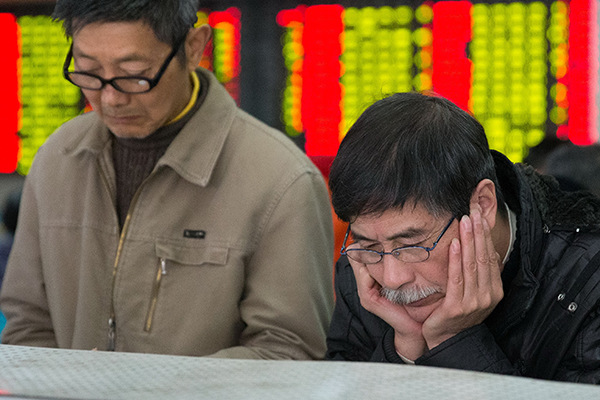
Investors check share prices at a brokerage in Nanjing, Jiangsu province, Dec 12, 2016. (Photo/China Daily)
The China Insurance Regulatory Commission hopes to reduce the proportion of total equity assets held by insurance funds to 30 percent. The limit was raised to 40 percent last year.
The move indicates the regulator wants to improve regulatory measures against the short-term and speculative use of insurance funds.
CIRC Vice-Chairman Chen Weihui said in an article published on Wednesday in People's Daily that the regulator is planning to introduce measures to curb speculative use of insurance capital in investing in the stock market, including forbidding insurers and non-insurance institutions from jointly acquiring listed companies, clarifying that insurance companies shall use their own capital, instead of insurance funds, for major investment in the stock market, and requiring insurance companies to file with the CIRC when they make major stock investments, and gain approval from the CIRC to acquire listed companies.
The CIRC will also set restrictions on the level of investment insurance firms can have in listed companies, reducing it from the previous 10 percent to 5 percent, said Chen.
Regulators have dispatched inspection teams to Evergrande Life Insurance Co and Foresea Life Insurance Co, two insurers that have allegedly been involved in inappropriate use of capital and unclear asset allocation, said Chen.
The two insurers' combined balance of stock investment was 57.4 billion yuan ($8.31 billion), 3 percent of the combined investment of insurance funds in the A-share market, said Chen.
Xiang Junbo, CIRC chairman, also said at a conference on regulating insurance firms' investment in the equity market that it will draw up a "negative list" and further clarify forbidden areas and investment behavior norms to better regulate insurers' acquisition behavior.
Xiang said insurers should play a part in stabilizing the market as institutional investors, but some recent activities contradict this goal, doing significant harm to the insurance sector's image and its long-term development.
China's insurance capital needs to serve the long-term and healthy development of the insurance sector, and should not turn investment into speculative buyouts, said Xiang.
Wang Guojun, an insurance professor at the University of International Business and Economics in Beijing, said the point of insurance is fundamentally for protection, and this should also be the case with the use of insurance funds.
"Only long-term, value-oriented and stable investment supports the real economy and the stable, healthy development of the capital market," said Wang.
CITIC Securities Co said in a research note that better regulation of the use of insurance funds benefits both the insurance and stock markets.


















































